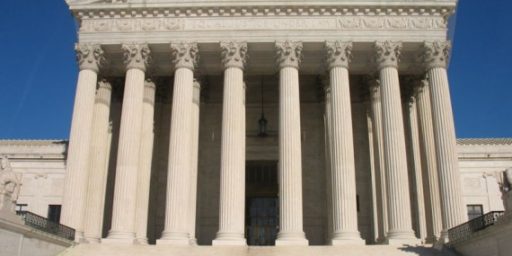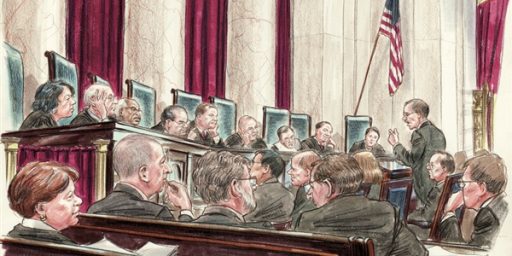How Much Did SCOTUS Limit The Commerce Clause?
So, we're safe from that broccoli mandate, right?
Doug Mataconis yesterday analyzed at some length the new limits on the Commerce Power embedded in yesterday’s ruling on ObamaCare. While the majority upheld the individual mandate as a tax, the ruled that Congress did not have the authority to force people to buy private products under the Commerce Clause. Because, you know, broccoli.
Laurence Tribe, who disagrees vehemently the the Commerce Clause should be so limited, nonetheless doesn’t see much practical impact:
In any event, contrary to a ridiculous allegation that Chief Justice Roberts somehow conspired to trick liberals with a win on health care into accepting newfound and exacting limits on the Commerce Clause, the dubious action-inaction distinction endorsed by today’s decision will likely do little to tie Congress’s hands going forward. While congressional action mandating economic activity is certainly not unprecedented — Congress in 1792, with nearly two dozen Framers on board and with George Washington among them, enacted a statute requiring all able-bodied men to purchase firearms, after all — Congress rarely mandates behavior on an individual level to accomplish regulatory goals. In other words, the federal code is not littered with other individual mandates for litigious scavengers to pick apart.
Thus for the same reason that this dispute over individual mandates grew into such an explosive battle, the action-inaction distinction in today’s opinion will probably play a larger role in history books than future cases. And after this bruising political battle over health care reform and the largely successful effort of the law’s opponents to persuade many Americans that Congress should refrain from similar regulatory approaches, the individual mandate has lost much of its prospective legitimacy in the realm of popular constitutional discourse. For this reason, Congress would have been unlikely to follow health care with similarly structured programs regardless of what the Supreme Court decided on the Commerce Clause question.
This is right insofar as it goes. For that matter, the “If Congress can require you to buy health insurance, it can require you to buy broccoli” argument, while apparently persuasive to a majority of the Supreme Court on a philosophical level, was always silly on a practical level. Why? Because there’s no way in hell a broccoli mandate could pass both Houses of Congress and get the president’s signature.
Then again, the Supreme Court isn’t in the business of judging what’s politically feasible but of deciding where the limits on state power are. Whether Congress was ever likely to mandate that Americans buy anything ever again, the Court yesterday erected a barrier against their doing so.
Of course, it’s not exactly settled law at this point. A single, narrow, decision won’t necessarily be considered binding by future courts–especially since the Commerce Clause decision wasn’t even central to the finding. (That is, the entire discussion could have been omitted and Roberts could simply have said, “We need not consider whether Congress has the power under the Commerce Clause to pass this measure, because they clearly have the power to do so under the Taxing Power.”) So, it’s not a slam dunk that this aspect of the ruling will have any impact aside from short-term fundraising and campaign speech fodder.







I don’t know why he has to make such a silly caveat to his opinion:
Nobody in 1792 would have thought of that as regulating interstate commerce, but part of the federal government’s Constitutional authority:
I think Roberts showed huge cajones by allowing a law that heralds the very end of the free-world to stand…in order to limit Nancy Pelosi’s ability to ever make me buy broccoli. His jiu-jitsu is crazy strong. I bet Scalia put him up to it.
@James:
Good post and:
Indeed3. The broccoli thing was strawman on slippery slope that drove me crazy. Although to judge from FB, Twitter, and even from comments from serious people in writing and in interviews, one that many people took (and still take) seriously.
Why can’t a level of government use taxes to encourage or discourage buying broccoli or anything else? According to the SCOTUS ruling, they can. The likelihood that they will focus on broccoli is irrelevant. It is what they will twist and turn to focus on that is, much of which we are probably not considering now.
For example, since States can’t outlaw abortion, now they can just tax the hell out of it. Put the same tax on everyone involve in the process as those under Obamacare who are non-insured. I can see several States doing that and that is just one possible example.
Although I agree (somewhat) with Professor Tribe that yesterday’s decision does not turn the clock back on Congressional overreach via the Commerce Clause, I am warming to the idea that it may still turn the tide. Unlike the law it upholds which may be modified- or even completely undone – within weeks a single election cycle, Roberts’ decision sets precedent which will be stretched and applied by capable attorneys and judges for many, many years to come.
Of course, as a Federalist, I’m an incurable optimist. But, hey, the alternative isn’t worth considering.
@Steven L. Taylor: People always take slippery slopes seriously when they suite their larger worldview. Thus the US will forever be on the precipice of either total social breakdown or total tyranny depending who you ask. Likewise we’re always one step away from man, machine, animal threesomes, putting granny to death when she needs one band-aide too many, and corporations freely buying and sell us.
@Wayne: If you actually rubbed together your brain cells you’d see how any discussion of Abortion shows the problem with your slipperly slope argument.
For years, conservative states (with conservative governing majorities) have been attempting to control Abortion rights through various legislative means. Yet, few of those bills ever make it into law (see the recent controversies in Virginia as an example). And again, note that that’s happening in States with conservative legislative majorities.
Just because something is a possibility doesn’t make it a high probability. Likewise, if this is the biggest slipperly slope you are worrying about, I have to suspect that partisan fears rather than a true intellectual concern about governmental overreach might just be motivating your ourtrage.
Just out of curiosity, how do you feel about the slippery slope aspects of the Patriot Act?
@Wayne: You’re totally right about the potential slippery slope here. Here’s another scary example of where this could all end up:
@Wayne:
Since, I dunno, but I’d bet, the effing beginning, the Congress has used the taxing authority to encourage/discourage behavior. The tax code in just chock full of the things. Do a google search on “federal tax incentives”.
@Steven L. Taylor: The “broccoli” argument always seemed false. After all, through the Emergency Medical Treatment and Active Labor Act (EMTALA), we force emergency rooms to give away broccoli for free. Isn’t that regulating commerce also? Or was that next on the agenda, to move to a system of health care solely based on ability to pay?
The way I remember it, most conservatives stood on their chairs and cheered at the top of their lungs during Bush’s vast expansion of the size, cost, and power of the federal government.
@Wayne: since States can’t outlaw abortion, now they can just tax the hell out of it.
Not really. Roberts was pretty careful in his opinion to point out that the minimal nature of the tax penalty, and the lack of criminal enforcement options, meant that the penalty was not coercive, and did not infringe other constitutional protections. Just because the court says that a law is an exercise of one of the articulated powers, does not mean that it is exempt from the articulated rights or protections.
I doubt that this decision will have much impact on Commerce Clause usage. While I prefer Ginsburg’s reasoning on the activity/inactivity issue, I am fine with Roberts’ interpretation. The only legitimate reason that I can see for regulating “inactivity” is to deal with free- rider problems created by the regulation of “activity”. Fortunately, the taxing power provides an ideal tool to deal with free-rider issues, and the fact that Roberts used enough common sense in the decision to find that acceptable is very comforting to me. On the other hand, the refusal of the dissenters (Kennedy especially) to acknowledge the obvious fact that the penalty is just a tax, regardless of what the legislation calls it, is quite troubling.